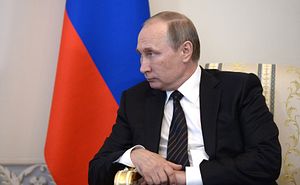It’s not an outcome many predicted, but Donald J. Trump was elected the 45th president of the United States on November 8.
Russian President Vladimir Putin was among the first world leaders to congratulate president-elect Trump. In the congratulatory message, posted by the Kremlin, Putin espoused the hope that the two leaders could “lift Russian-U.S. relations out of the current crisis, resolve issues on the international agenda, [and] look for effective responses to global security challenges.”
The missive went on to highlight hopes for “a constructive dialogue based on the principles of equality, mutual respect, and genuine consideration for each other’s positions.”
Russian politicians were barely able to hide their glee at the news of Trump’s victory over Democratic nominee. The Russian parliament burst into applause when Trump’s victory was announced.
Sergey Zheleznyak, a member of Putin’s party United Russia, said in a statement, “people supported [Trump’s] intention to address the serious problems that have accumulated in America, and to move from confrontation to cooperation with Russia and the world.”
Vladimir Zhirinovsky, head of the Liberal Democratic Party, said merrily, “We will make up Mr. Trump a telegram of congratulations: Dear Donald, we congratulate you on a well-deserved victory. Grandmother Hillary can take some rest now.”
Russian-U.S. relations have been in a downward spiral since the spectacular failure of the “reset.” The “reset” was symbolically launched in 2009 with the gifting of a big red button (meant to read “reset” it actually translated to “overload”) by then-Secretary of State Hillary Clinton to Russian Foreign Minister Sergei Lavrov. The reset policy was meant to repair relations damaged by Russia’s 2008 invasion of Georgia, and introduce nuance to the relationship. The Obama administration hoped it could work with Russian in some areas, while acknowledging disagreement in others.
A 2010 U.S.-Russia “Reset” Fact Sheet noted, “President Obama sought to reset relations with Russia and reverse what he called a ‘dangerous drift’ in this important bilateral relationship” by engaging Moscow “to pursue foreign policy goals of common interest – win-win outcomes – for the American and Russian people. ”
The reset policy was deeply criticized by the Republican establishment at the time. In late 2011, as U.S. President Barack Obama and Putin both headed for reelection, Republican Senator John McCain asked in a speech on the Senate floor, “What has been the result of the administration’s good-faith desire for a so-called reset of relations with Russia?”
“The answer, I’m afraid, is preciously little,” he answered.
Mitt Romney, the 2012 Republican presidential nominee famously said during that year’s presidential debates that Russia “is without question our number one geopolitical foe.”
Fast forward – through Putin’s reelection, the crisis in Ukraine, the annexation of Crimea, Western sanctions on Russia, and the devastating crash in oil prices – to arrive at a U.S. presidential campaign that broke countless precedents and stretched the bounds of traditional analysis (not to mention polling).
Russia was among the campaign’s many issues, but not in the way it was in 2012. In 2012, the accusation (from the Republican side) was that the Democrats were being too lenient with Russia. In 2016, the core Russian issue was not Ukraine or Syria, but the accusation (from the U.S. intelligence community) that the Russian government had stolen and leaked thousands of emails from the Democratic National Committee and others associated with the Clinton campaign with the clear aim to “interfere with the U.S. election process.”
Russia is happy to see Trump elected president because he represents an opportunity to, dare I say it, reset relations.
“I have always felt that Russia and the United States should be able to work well with each other towards defeating terrorism and restoring world peace, not to mention trade and all of the other benefits derived from mutual respect,” Trump said in December 2015.
Trump was criticized by Democrats for lauding Putin, calling him a “bright” person and “strong leader.” At the same time, Trump always struck a tone that resonated in Moscow while avoiding discordant notes. Absent from Trump’s vocabulary is the language of human rights– something Moscow is quite pleased about. The perception in Moscow has long been that Western advocacy of human rights and political freedoms were little more than “color revolutions” in disguise.
Improved relations between the United States and Russia would be a boon for some and a disaster for others. In Syria, for example, the U.S. and Russian positions have been divergent when it came to the legitimacy of the Bashar al-Assad regime. Trump, who has said he has a secret plan to defeat the Islamic State (ISIS), toes the Kremlin line in depicting the conflict as a choice between fighting ISIS or fighting Assad. Other winners may be Russian businessmen and their American partners, as there is an expectation that Trump will work to ease sanctions.
The losers are harder to define because they are the people who will fall between the cracks when big states decide to turn a blind eye to the domestic sins of their foreign partners. Certainly the besieged people of Syria and those in eastern Ukraine stand to lose with the apparent abdication by Trump of long-standing American ideals which, even imperfectly applied, were global in scope.
While many admire Trump’s “pragmatism” and have raged against American interventions, the consequences of Washington receding to the sidelines and conducting international relations like cold business transactions could be devastating around the world as leaders see success in abandoning the language of hope and progress.

































